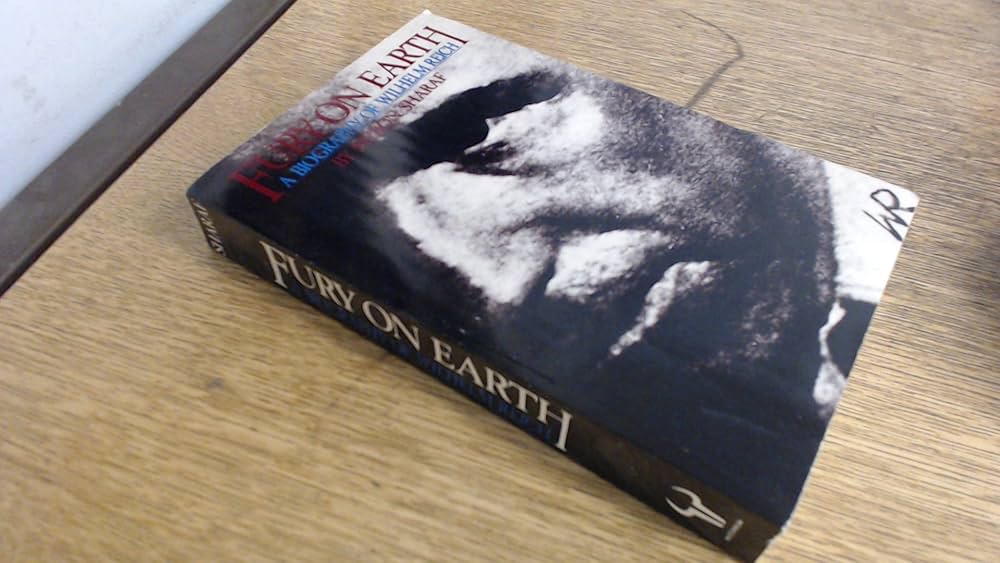Book Summary: Fury on Earth: A Biography of Wilhelm Reich (PDF)
Author: Myron Sharaf
Genre: Biography, Psychology, History
“Fury on Earth: A Biography of Wilhelm Reich” is one of the most powerful and deeply researched biographies ever written about a man who was both a visionary scientist and a misunderstood rebel — Wilhelm Reich. Written by Myron Sharaf, who was not only Reich’s student but also one of his closest associates, this biography presents the rise, fall, and tragic end of a man whose ideas were far ahead of his time.
Wilhelm Reich was a psychoanalyst, psychiatrist, and scientist, once considered one of the most promising students of Sigmund Freud. But what makes Reich’s life story so compelling is not only his brilliance but also the controversy, passion, and conflict that surrounded him. This book explores how his radical ideas about sexuality, human freedom, and energy made him both famous and hated.
Early Life and Education
The book begins by describing Reich’s childhood in rural Austria, where he grew up in a strict and emotionally intense family. His early experiences with his parents’ unhappy marriage and his mother’s tragic death deeply affected his psychology. Sharaf beautifully connects these early experiences to Reich’s later obsession with emotional repression and sexuality.
After World War I, Reich studied medicine and psychiatry in Vienna, where he came under the influence of Sigmund Freud. Reich quickly became one of Freud’s favorite students because of his passion and original thinking. He believed that sexual repression was not just a personal problem but a social and political issue affecting all of humanity.
Reich’s Work with Freud and His Break from Psychoanalysis
Reich contributed many fresh ideas to psychoanalysis. He introduced the concept of “character armor”, which means that people develop emotional and physical tensions to block their true feelings. This was a revolutionary idea at the time.
However, Reich’s growing interest in sexual liberation and politics made him an outsider in the conservative psychoanalytic world. He openly criticized the bourgeois nature of psychoanalysis and said that sexual energy (which he called orgone energy) was the key to both personal and social health.
His political involvement with Marxism and his support for sexual freedom during the 1920s and 1930s created strong opposition. As a result, Reich was expelled from both the Psychoanalytic Association and the Communist Party.
The Concept of Orgone Energy and the Birth of Controversy
One of the most controversial chapters of Reich’s life revolves around his discovery of Orgone Energy. Reich believed that this was a cosmic life force, present everywhere in the universe. According to him, it was the source of sexual energy, emotional healing, and even weather control.
He designed devices called Orgone Accumulators, which he claimed could store this life energy and help people cure illnesses, including cancer. This idea brought him massive attention in America during the 1940s but also led to governmental and scientific backlash.
Many scientists dismissed his experiments as pseudoscience, while others saw him as a dangerous radical. However, Reich’s passion for discovering the truth never stopped.
Conflict with the U.S. Government and Imprisonment
The biography takes a tragic turn when Reich’s work comes under the scrutiny of the U.S. Food and Drug Administration (FDA). In the 1950s, the FDA accused Reich of making false medical claims regarding the Orgone Accumulator.
Even though Reich refused to appear in court (as he believed science should not be judged by the law), the court ruled against him. His books, research papers, and equipment were burned — a shocking act of censorship in modern American history.
Eventually, Reich was imprisoned for violating the court’s injunction. In 1957, he died in prison, leaving behind a legacy that remains both inspiring and haunting.
Psychological Insights and Legacy
What makes Fury on Earth special is not just the storytelling but also how Myron Sharaf blends psychology with biography. The author portrays Reich as both a genius and a tragic figure — someone who genuinely believed in human freedom but was destroyed by his own obsessions and the world’s fear of new ideas.
Sharaf shows how Reich’s emotional struggles, paranoia, and passion for truth shaped his scientific discoveries and personal downfall. Despite the controversies, Reich’s ideas about sexual health, body-mind connection, and emotional expression influenced modern psychotherapy, humanistic psychology, and even modern medicine.
Writing Style and Structure
Sharaf writes with both academic depth and emotional sensitivity. The language is clear, and the narrative feels like a movie of a man’s life — from his days in Vienna to his lonely death in an American prison cell.
The book is not only for psychologists but also for readers interested in human behavior, freedom, and the fine line between genius and madness. Sharaf neither worships Reich nor condemns him — instead, he gives readers the full picture to make their own judgment.
Why You Should Read Fury on Earth
If you want to understand how a man can dedicate his life to the truth, fight the world’s misunderstanding, and still stand tall, then this book is for you.
It is not just a biography — it is a mirror that reflects how society often rejects those who challenge its limits.
Reich’s life reminds us that science, politics, and emotion are deeply connected. His story is also a warning — how fear of new ideas can destroy innovation.
Even though many of Reich’s theories remain controversial, his courage, honesty, and unbreakable belief in human freedom make Fury on Earth a masterpiece of modern biography.
Conclusion
Fury on Earth: A Biography of Wilhelm Reich is not just a book about a scientist — it is a story about the power of ideas, the pain of rejection, and the endless search for truth.
Through this biography, Myron Sharaf helps us see Wilhelm Reich as a complex human being — not just a rebel, not just a genius, but a man who tried to understand life itself.
It’s a book that will make you think deeply about freedom, emotion, and the boundaries of human knowledge.










